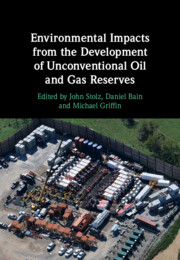Book contents
- Environmental Impacts from the Development of Unconventional Oil and Gas Reserves
- Environmental Impacts from the Development of Unconventional Oil and Gas Reserves
- Copyright page
- Contents
- Figures
- Tables
- Contributors
- Preface
- Part I Overview
- 1 Global Unconventional Oil and Gas Reserves and Their Development
- 2 Unconventional Shale Gas and Oil Extraction in the Appalachian Basin
- 3 An Overview of Unconventional Gas Extraction in Australia
- 4 The Governance of Fracking
- Part II Environmental Analysis
- Part III Case Studies
- Index
- References
1 - Global Unconventional Oil and Gas Reserves and Their Development
from Part I - Overview
Published online by Cambridge University Press: 28 July 2022
- Environmental Impacts from the Development of Unconventional Oil and Gas Reserves
- Environmental Impacts from the Development of Unconventional Oil and Gas Reserves
- Copyright page
- Contents
- Figures
- Tables
- Contributors
- Preface
- Part I Overview
- 1 Global Unconventional Oil and Gas Reserves and Their Development
- 2 Unconventional Shale Gas and Oil Extraction in the Appalachian Basin
- 3 An Overview of Unconventional Gas Extraction in Australia
- 4 The Governance of Fracking
- Part II Environmental Analysis
- Part III Case Studies
- Index
- References
Summary
The Energy Information Administration (EIA) has assessed 46 countries for their technically recoverable unconventional oil and gas reserves. They estimate the global shale gas reserves at 7,577 Tcf (trillion cubic feet) and the global shale oil reserves at 419 billion bbl (barrels). The 10 largest reserves for shale gas are in China, Argentina, Algeria, United States, Canada, Mexico, Australia, South Africa, Russia, and Brazil. The European Union also has significant deposits with the majority located in Poland and France. The 10 largest reserves for shale oil are in the United States, Russia, China, Argentina, Libya, United Arab Emirates, Chad, Australia, Venezuela, and Mexico. To date, only the United States and Canada have reached commercial level production for shale gas and oil, followed to a lesser extent by China and Argentina. Australia has seen its efforts concentrate on liquified natural gas (LNG) and export. Most other countries remain in the exploratory phase or have halted development. This chapter provides a brief review of the major shale gas and oil plays based on the extensive assessment done by the EIA, and the current status of their development.
- Type
- Chapter
- Information
- Publisher: Cambridge University PressPrint publication year: 2022
References
- 1
- Cited by

